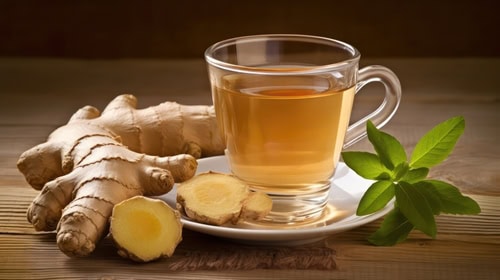Millions of people deal with high uric acid levels across the world, and India is no exception. High uric acid levels can be a risk factor for a painful form of arthritis, gout, and various other conditions. It is often the hidden culprit behind swollen toes, unexplained stiffness in the body. Imagine waking up to a foot so tender that even a bedsheet feels like a heavy burden, or enduring persistent aches that steal your ease of movement.
Whether caused by unhealthy lifestyle habits like excessive alcohol, dietary habits, or genetic predisposition, the sharp, stabbing pain of elevated uric acid has become an unwelcome guest for many. What if the solution were as simple as a comforting drink from your own kitchen?
But the good news is that some simple drinks made from common kitchen ingredients may help prevent high uric acid levels. Let’s dive deep into Indian drinks to help lower uric acid and the science behind it
Beyond beneficial sips for high uric acid levels, we’ll cover beverages to avoid and common questions to support your gout management better.
Understanding Uric Acid and Gout
Before we dive into remedies, let’s briefly understand the adversary. Uric acid is a waste product formed when your body breaks down purines, substances found naturally in your body and certain foods. Normally, your kidneys filter uric acid out, and it leaves your body through urine. However, if your body produces too much uric acid or your kidneys don’t excrete enough of it, levels can build up in your blood. This condition is called hyperuricemia. When these levels get too high, uric acid crystals can form in your joints, leading to the incredibly painful inflammation known as gout. It can also contribute to kidney stones.
Natural Relief in Every Sip: Drinks That Can Help
The Mighty Water
 This is unarguably your most powerful tool. Staying hydrated is absolutely vital for flushing out uric acid. Drinking sufficient water dilutes your urine, making it easier for your kidneys to filter and expel uric acid from your system. Aim for at least 8-10 glasses a day.
This is unarguably your most powerful tool. Staying hydrated is absolutely vital for flushing out uric acid. Drinking sufficient water dilutes your urine, making it easier for your kidneys to filter and expel uric acid from your system. Aim for at least 8-10 glasses a day.
Lemon Water

A simple squeeze of lemon into your daily water can make a difference. Lemons are rich in Vitamin C, which some studies suggest may help reduce uric acid levels. Its alkaline-forming effect in the body can also help neutralize excess acid [4].
Cherry Juice

Cherries, especially tart cherries, are renowned for their anti-inflammatory and antioxidant properties. Research suggests they can help lower uric acid levels and reduce the frequency of gout attacks. Consider unsweetened cherry juice or fresh cherries when in season [1].
Moderate Coffee Consumption

For some individuals, moderate coffee intake has been linked to lower uric acid levels. This could be due to compounds in coffee that increase the excretion of uric acid. However, moderation is key, and consult your doctor if you have other health concerns [2].
Ginger Tea
Ginger is a well-known anti-inflammatory powerhouse. Sipping on ginger tea can help reduce inflammation associated with gout flares. While not directly lowering uric acid, it can certainly soothe the painful symptoms.
Low-Fat Dairy Products

Incorporating low-fat milk, yogurt, or buttermilk (chaas) into your diet may be beneficial. Some studies indicate that certain proteins in dairy can enhance the excretion of uric acid [3].
Know Your Foes: Drinks to Avoid for Managing High Uric Acid
Just as some drinks help, others can actively work against you:
-Sugary Drinks (Especially with High-Fructose Corn Syrup): Soft drinks, packaged fruit juices (even if they claim to be “natural”), and other sweetened beverages are major culprits. Fructose, a type of sugar, can rapidly increase uric acid production in the body.
-Alcohol: Beer, in particular, is high in purines and can significantly raise uric acid levels. Hard liquor and wine can also contribute to the problem, though perhaps to a lesser extent than beer. Limiting or avoiding alcohol is crucial for gout management.
-Fructose-Rich Fruit Juices: While whole fruits are generally healthy, their concentrated juice forms can deliver a high dose of fructose, which can elevate uric acid. Opt for whole fruits over juices.
Maximizing Your Fluid Intake: Practical Tips
Successfully managing uric acid often comes down to consistent hydration. Here are some simple ways to make drinking enough fluids easier:
-Infuse Your Water: Bored with plain water? Infuse it with slices of cucumber, mint, lemon, ginger, or berries for a refreshing twist without added sugar.
-Carry a Reusable Water Bottle: Make it a habit to carry a water bottle with you wherever you go – to work, while running errands, or during your workouts.
-Set Reminders: Use your phone to set hourly reminders to sip on water. There are also many apps designed to help you track your water intake.
-Drink Before Meals: Having a glass of water before each meal can also contribute significantly to your daily fluid intake. If you have persistent concerns of heartburn or gastritis, skip taking water one hour before and after your meals.
Reclaim Your Comfort and Well-being
Managing high uric acid levels doesn’t have to be daunting. By understanding the role of your diet and making simple, consistent changes to your daily fluid intake, you can take significant steps towards preventing painful flare-ups and supporting your overall health. Your kitchen truly holds powerful remedies.
Remember:
This article provides general information and is not a substitute for professional medical advice. Always consult with a healthcare professional or a registered dietitian before making significant changes to your diet or treatment plan, especially if you have pre-existing medical conditions or are on medications.
FAQs: Uric Acid & Drinks (Quick Answers)
Q1: What’s uric acid, and why the fuss?
A1: Uric acid is a metabolic waste product produced by your body that breaks down chemicals called purines in food and drinks. Too much uric acid can cause gout (joint pain) and kidney stones.
Q2: What’s gout?
A2: Painful joint inflammation (often the big toe) caused by uric acid crystals.
Q3: Which drinks are most effective in helping to lower uric acid levels?
A3: The most crucial drink is water. Other beneficial drinks include lemon water, cherry juice, moderate coffee, ginger tea, and low-fat dairy.
Q4: Are there any specific drinks I should avoid if I have high uric acid or gout?
A4: Yes, it’s highly recommended to limit or avoid sugary drinks and fructose-rich fruit juices. These can significantly increase uric acid production in your body.
Q5: How much water should you take daily?
A5: Aim for 8-10 glasses (2-3 liters) to help the kidneys flush it out.
Q6: Can drinking alone cure gout?
A6: No, they’re a great help, but usually part of a bigger plan (diet, lifestyle, maybe meds).
Q7: How long does it take to see effects from incorporating these drinks into my diet?
A7: The effects can vary from person to person. Consistent and regular intake of beneficial drinks, alongside avoiding detrimental ones, will gradually contribute to better uric acid management over weeks to months.
Q8: Can I ignore diet/lifestyle changes if I am consuming the natural drinks for uric acid levels?
A8: For optimal management of uric acid, a holistic approach is best. While these drinks are very helpful, they work best when combined with a balanced diet, maintaining a healthy weight, and staying physically active
Q9: Are there any side effects from consuming these drinks regularly?
A9: For most healthy individuals, consuming these recommended drinks in moderation is safe. However, if you have specific health conditions or are on medications, it’s always best to consult your doctor or a dietitian
Recommended Reads
High Uric Acid? Say Hello to Summer Fruits
6 Best Dry Fruits To Lower High Uric Acid Level
References:
1. Kelley DS, Adkins Y, Laugero KD. A Review of the Health Benefits of Cherries. Nutrients. 2018;10(3):368. Published 2018 Mar 17.
2. Zhang Y, Yang T, Zeng C, et al. Is coffee consumption associated with a lower risk of hyperuricaemia or gout? A systematic review and meta-analysis [published correction appears in BMJ Open. 2016 Jul 18
3. Lu Z, Tang Z, Guo X, et al. Effect of the Intake of Solid Block Dairy Products Like Cheese on Serum Uric Acid in Children: A Preliminary Mechanistic Investigation. Nutrients. 2024;16(22):3864. Published 2024 Nov 12.
4.. https://www.frontiersin.org/journals/immunology/articles/10.3389/fimmu.2024.1431323/full

